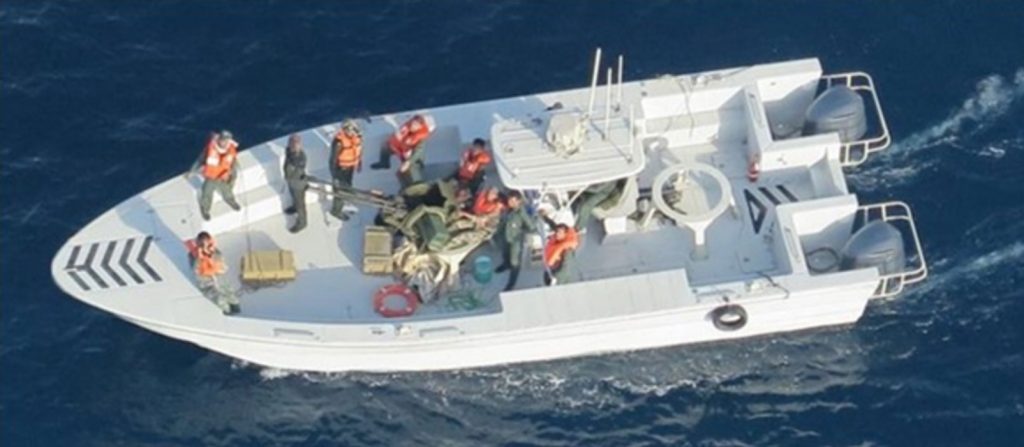By John Mecklin
 Pick your metaphor: Slo-mo video of imminent car crash. Two cats circling, back fur up and claws ready. A tail vigorously wagging its growling dog (to distract from possible impeachment). Given recent events, any reasonable response to the current state of US-Iranian relations almost has to include a good measure of foreboding.
Pick your metaphor: Slo-mo video of imminent car crash. Two cats circling, back fur up and claws ready. A tail vigorously wagging its growling dog (to distract from possible impeachment). Given recent events, any reasonable response to the current state of US-Iranian relations almost has to include a good measure of foreboding.
The latest of those events is ominous, indeed, with Iran announcing on Monday that it would exceed the limits on its enriched uranium stockpile imposed by the landmark Iran nuclear deal—within a matter of days. In a press conference, a spokesman for Iran’s Atomic Energy Organization indicated the country might also begin increasing the enrichment level of the uranium fuel it produces—from less than 4 percent up to 20 percent—a move that would help the country produce medical isotopes but would also move at least some of its uranium stocks closer to weapons-grade. (Uranium used in nuclear warheads would generally be enriched to contain more than 90 percent of the fissile isotope uranium 235.)
As the New York Times explained:
The move was the country’s latest signal that it will abandon the [nuclear agreement] unless other signatories help Iran circumvent economic sanctions imposed by President Trump. The threat seemed aimed primarily at the European signatories, to persuade them to break with Washington and swiftly restore some of the economic benefits of the deal to Tehran.
Meanwhile, Foreign Policy reported, the United States considered a full range of options, including military reinforcements, as a response to attacks on two oil tankers in the Gulf of Oman that the Trump administration claims were orchestrated by Iran, a claim that Iranian leaders deny. “At the Pentagon,” the FPSecurity Brief said, “officials are reportedly weighing a proposal from US Central Command to send as many as 6,000 additional forces to the region, including two fighter squadrons, US Navy destroyers and submarines, as well as several Patriot missile defense batteries.” In a subsequent press release, Acting Secretary of Defense Patrick Shanahan said, “In response to a request from the U.S. Central Command (CENTCOM) for additional forces, and with the advice of the Chairman of the Joint Chiefs of Staff and in consultation with the White House, I have authorized approximately 1,000 additional troops for defensive purposes to address air, naval, and ground-based threats in the Middle East.”
Despite its well-earned credibility problems, the Trump administration also widened its efforts to blame Iran for instability across the region. As widely respected Columbia University Middle East expert Gary Sick told NPR:
Perhaps the most interesting part of it is the number of loose ends that we have. On one hand, Secretary (of State Mike) Pompeo said there was no doubt Iran was responsible for the whole thing. And he listed a whole series of things that he said Iran had been doing, one of which was apparently an unknown militia in Iraq and the other was action by the Taliban in Afghanistan.
So maybe Iran really was responsible for the attacks on the tankers. But I think the fact that Pompeo chose to blame them for absolutely everything that’s going on in the region that we don’t like is a pretty good indication that the United States really is on a kind of propaganda campaign against Iran. But that doesn’t solve the problem.
The increasingly tense situation in the Persian Gulf is a fairly direct result of the Trump administration’s decision to exit the painstakingly negotiated Iran nuclear deal. The administration’s attempts to place “maximum pressure” on Tehran via sanctions that aim to cut off all of the country’s oil exports have not had the intended effect of forcing the Iranians to acquiesce to new negotiations toward an agreement that is somehow “better” than the deal Iran struck with six major nations in 2015. Instead, in response, Iran has edged cautiously toward violating the agreement, seeking leverage and perhaps attacking oil tankers and other targets toward the same end; President Trump has, variously, blustered about Iran’s perfidy or insisted that he doesn’t want to make war; Secretary of State Pompeo has blamed Iran for every misdeed in sight, sometimes putting forward remarkably little evidence; and if you believe this piece in The Jerusalem Post, the United States has made plans to bomb one of Iran’s nuclear facilities.
If I knew a metaphor worrisome enough to fit the situation, I would write it here.
No comments:
Post a Comment